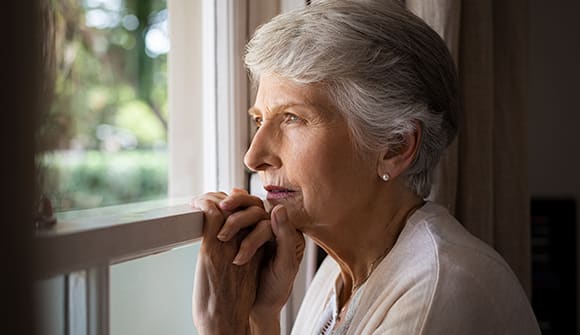Which age is most lonely?
How to combat feelings of isolation at any age.
Article Author: Katie McPherson
Article Date:

Researchers at the University of California, San Diego, recently published a study with some interesting findings for three particular age groups. The team discovered that loneliness peaks at three ages for most people: the late 20s, mid-50s and late 80s. More than 300 San Diego County residents between the ages of 27 and 101 participated in the study.
When it comes to why these three age groups are most at risk, however, the scientists still have work to do. For those in their 20s, they speculate that because this age involves making many life decisions, it may increase loneliness as old relationships end and people experience guilt over their choices. For people in their 50s, the working theory is that this is the time when health begins to decline, and friends begin passing away. And in the 80s age group, deaths of family, friends and spouses may leave a person without as many deep connections.
Nicole Winter, PsyD, a clinical psychologist at Baptist Behavioral Health and the AgeWell Center for Health, says it's important to know that loneliness doesn't just strike those who are physically alone.
"I believe that loneliness is more about feeling alone rather than actually being alone. I prefer to differentiate loneliness from solitariness in that solitary means preferring to be alone and lonely means suffering from being alone or feeling isolated. I am a strong believer that even those with several friends or social contacts can still feel lonely and that loneliness isn't always negative."
With that understanding, Dr. Winter explains why she thinks loneliness hits at each of these age milestones. For those in their twenties, a little bit of loneliness may just be part of growing up and spreading your wings.
"Our late 20s is a time often accompanied by problems with money as college ends, career confusion or difficulty and romantic challenges. It is during this timeframe when we generally become more independent by branching off from parents and college friends and expect to have a career, committed relationship, and fabulous social life. If by this time we do not, people in this age group can feel as if they have already failed. Add in the unrealistic expectations highlighted on social media and that can be a recipe for feeling lost, alone and, ultimately, lonely."
People in their 50s, however, may experience heightened loneliness as they struggle to determine their wants and needs, while their peers may seem to have it all together.
"Middle age can be an especially lonely phase of life as a result of feeling confused as to who we are and who we will be, in addition to disappointments and anxieties of unfulfilling work, unhappy family life and our own or others' poor health," says Dr. Winter.
Dr. Winter agrees with the study's researchers that the 80s may bring on loneliness simply because, by that age, many people have lost a number of their deep relationships.
"Loneliness is a common source of distress, suffering, and impaired quality of life in older persons. With age often comes a multitude of life changes such as the death of loved ones, retirement, stressful life events, or dealing with various medical issues, all of which can increase the risk for and susceptibility to loneliness," she says.
It's important for doctors to address loneliness with patients of these ages because it can have negative effects on health besides just making a person feel down.
"Persistent loneliness is not only emotionally and mentally painful but can be damaging to physical health. The most common negative effects I see in those who identify as feeling lonely include experiences of depression and anxiety, poor or disturbed sleep in both quantity and quality, reduced immune and cardiovascular functioning, functional impairment, and signs of early cognitive decline," she says.
In order to avoid these health consequences, no matter the age or cause of loneliness, Dr. Winter says changing your thought process can help you have positive, productive relationships with others.
"Persistent loneliness often makes individuals increasingly sensitive to rejection. They often have a tendency to convey negativity and remember and pay more attention to the negative, which ultimately leads to increased negative expectations or pushing others away because of perceived rejection," she explained. "Changing maladaptive thinking is the process of identifying, testing and challenging negative thoughts when they occur. During this process, an individual learns to consider other possibilities and practice trying to see things from the perspective of others. Then they're able to interpret their actions more benignly. Once the negative thoughts are challenged and eventually eliminated, a person who identifies as feeling lonely can begin approaching new relationships with a positive, optimistic outlook."
If you feel alone or isolated more often than not, call 904.376.3800 to find a Baptist Behavioral Health provider who can help you find a solution.
* Study: *cambridge.org/core/journals



